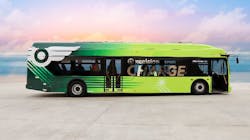NCTD showcases hydrogen and electric buses at November board meeting
The North County Transit District (NCTD) will provide key updates regarding the status of zero-emission bus (ZEB) technologies and NCTD’s specific implementation plans, among other things, at an upcoming board of directors meeting Nov. 21 in Oceanside, Calif.
There will also be presentations from NCTD’s ZEB implementation consultant, STV, Inc., regarding the state of ZEB technology and NCTD’s implementation plan. Additionally, the meeting will include a presentation from the CEO of Alameda-Contra Costa Transit District Michael Hursh, regarding its hydrogen bus program. An electric bus from the San Diego Metropolitan Transit System and a hydrogen fuel cell bus from the SunLine Transit Agency will be on display at the NCTD General Administration Office.
In December 2018, the California Air Resources Board (CARB) adopted the Innovative Clean Transit Regulation (ICT) for transit agencies. The ICT requires all public transit agencies to transition to a 100 percent ZEB fleet by 2040. The ICT is consistent with and supports state policies, including the Sustainable Communities and Climate Protection Program (SB 375) and the Clean Energy and Pollution Reduction Act (SB 350) focused on reducing greenhouse gas emissions.
Prior to the CARB regulatory mandate, NCTD was already proactively working towards implementing ZEB technology. In April 2017, NCTD executed an agreement with San Diego Gas & Electric that will help install some of the critical infrastructure required for operations. Additionally, in April 2018, NCTD was awarded a grant of $1.2 million from the Federal Transit Administration to help fund the purchase of battery-powered buses. NCTD has recently submitted a grant application to the Volkswagen Environmental Mitigation Trust for $3.2 million that will help fund the purchase of hydrogen-powered buses.
NCTD began the process of developing the CARB-required ZEB rollout plan in February 2019. Staff first completed an initial review of the fleet replacement requirements necessary to conform with the ICT by 2040. Additionally, NCTD retained consultant STV, Inc. to explore NCTD’s vehicle, facility and operational needs, and to provide a full analysis, recommendations, procurement documents and engineering plans for facilities to meet the ZEB plan requirements.
Based on information gathered through discussions with agencies that have purchased and deployed zero-emission technology and the information regarding ZEB infrastructure requirements from STV, NCTD anticipates purchasing 14 ZEBs (six battery powered and eight hydrogen fueled) prior to 2023. These will be used to offset future ICT-required ZEB purchases until 2025 or 2026, giving NCTD time to study the performance of the ZEBs in NCTD’s operating environment. NCTD says it estimates that the total cost of facility improvements and purchase of vehicles will range from $194 million to $217 million for battery-powered buses, and from $188 million to $226 million for hydrogen-fueled buses.
“Using electric and hydrogen buses in the NCTD fleet will be a big step towards cleaner air and reducing greenhouse emissions,” said NCTD Board Chair and Encinitas City Councilmember Tony Kranz. “NCTD looks forward to offering this new technology to our communities while moving towards a greener future.”
